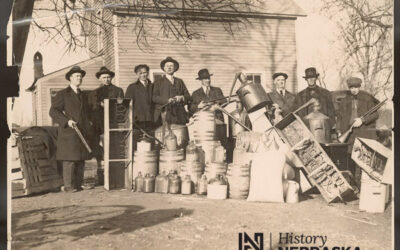William A. Paxton, rancher, cattleman, and early Omaha businessman, was born in Kentucky in 1837 and moved with his family to Missouri at the age of twelve. Soon afterward Paxton was employed by a nearby farmer, and by the time he was fifteen, he had started his own business breaking prairie sod for new settlers.
He first arrived in Omaha in 1857 and became the foreman of a bridge-building crew on the military road between Omaha and Fort Kearny. He eventually entered the freighting business, hauling between Omaha and Denver.
In 1867 Paxton received a contract from the Union Pacific Railroad for grading the roadway west of Julesburg, Colorado, and was employed by the railroad, first as foreman of a crew hired to supply railroad ties, and then as manager of a large railroad construction gang. Paxton returned to Omaha in 1868 and contracted with the Omaha and Northwestern Railroad the next year to build lines north from Omaha to Oakland, Nebraska.
Paxton next became involved in the cattle business. He bought cattle at Abilene, Kansas, and drove them to Omaha, sold them, and went into ranching near Ogallala, where he operated the Keystone Cattle Company ranch. He also owned ranches near Hyannis and Paxton, Nebraska, which was named for him.
Beginning in 1875 Paxton was associated with several Omaha businesses. In 1879 he became a principal stockholder in the Nebraska Telephone Company, and in 1882, vice-president of the Omaha Savings Bank. The same year, in partnership with Ben Gallagher, he organized the Paxton and Gallagher Wholesale Grocery firm. Paxton was one of the organizers of the Paxton-Veirling Iron Works in 1886. He was part of a group which in 1880 purchased and developed a tract of land in Omaha which became the site of the Nebraska State Fair for several years.
In 1878 Paxton helped form the first Union Stockyards Company in Omaha. He also helped organize related businesses, including the Union Stockyards Bank of South Omaha, Union Stockyards Railroad Company, the Union Elevator, the Union Trust Company, and the South Omaha Land Syndicate, of which he was vice-president. His leadership was an essential factor in Omaha’s becoming a prominent stockyards and meatpacking center.



